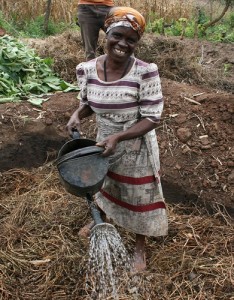MOTIVATION
Malawi ranks among the world’s most densely populated and least-developed countries. Despite recent economic growth, as of 2010, more than 50 percent of the population was still living below the poverty line, according to the World Bank. Poverty and hunger are widespread, with more than half of children younger than five too short for their age and almost one in five underweight for their age due to undernutrition. Because agriculture is the main source of income for most of the population, the development of targeted policies that spur growth in the sector, particularly in smallholder-based agriculture, is critical to meeting the country’s food security and poverty reduction goals. Essential to the development of these policies is state of-the-art research, and IFPRI researchers have met this soaring demand.
The Malawi Strategy Support Program was established in 2010 to promote demand-driven, in-country research and policy analysis, building on local capacity. With Irish Aid funding, the program provides technical assistance to the Ministry of Agriculture and Food Security working with local collaborators.
OUTCOMES
- Malawi’s Agricultural Sector-Wide Approach: IFPRI supports the implementation of the Malawi Agricultural Sector-Wide Approach, an initiative to accelerate agricultural growth through efficient resource allocation and development strategy, consistent with the Comprehensive African Agricultural Development Programme. IFPRI’s research results have been included in official government documents such as the CAADP Post-Compact Review: Malawi, and the Ministry of Agriculture and Food Security’s Malawi Agricultural Sector-Wide Approach: A Prioritised and Harmonised Agricultural Development Agenda: 2011–2015.
- Conservation Agriculture: IFPRI is a partner of Malawi’s National Conservation Agriculture Task Force hosted by the Department of Land Resources and Conservation of the Ministry of Agriculture and Food Security. The Task Force brings together stakeholders from government, the private sector, civil society, and academia to coordinate the promotion of conservation agriculture—a practice that adapts farming systems to the challenges of climate change by improving soil fertility and protecting the natural resource base. With the support of Irish Aid, IFPRI facilitated the development of the task force’s strategy, and supported a demand-driven baseline survey titled Approaches to the Implementation of Conservation Agriculture among Promoters in Malawi.
- Farm Input Subsidy Program: IFPRI is conducting an analysis, financed in part by Irish Aid Malawi, on the economy wide impacts of the program, focusing, among other things, on weather risk, fertilizer price risk, and the economic policy environment in Malawi. IFPRI’s research reports on Malawi’s Farm Input Subsidy Program have been recognized by partners as key sources of information on the program. Additionally, Irish Aid Malawi cofunded three other research papers in 2012 on the topics of crop diversification, multidimensional poverty, and analysis of Malawi’s food and nutrition security.



